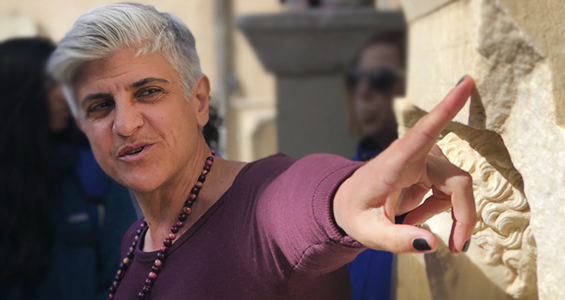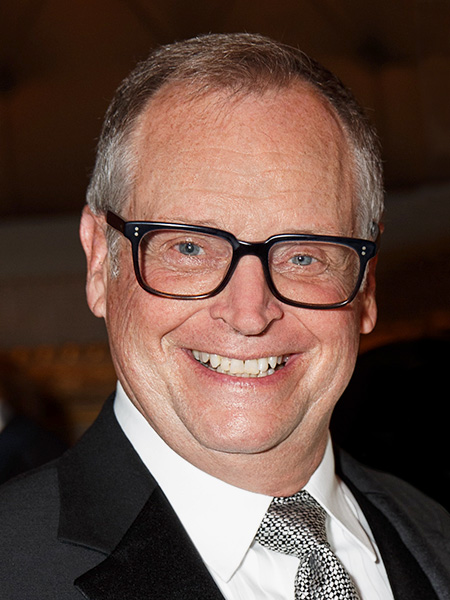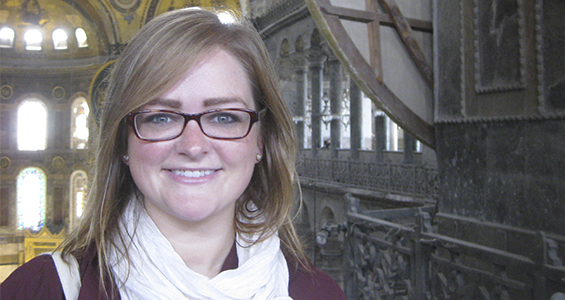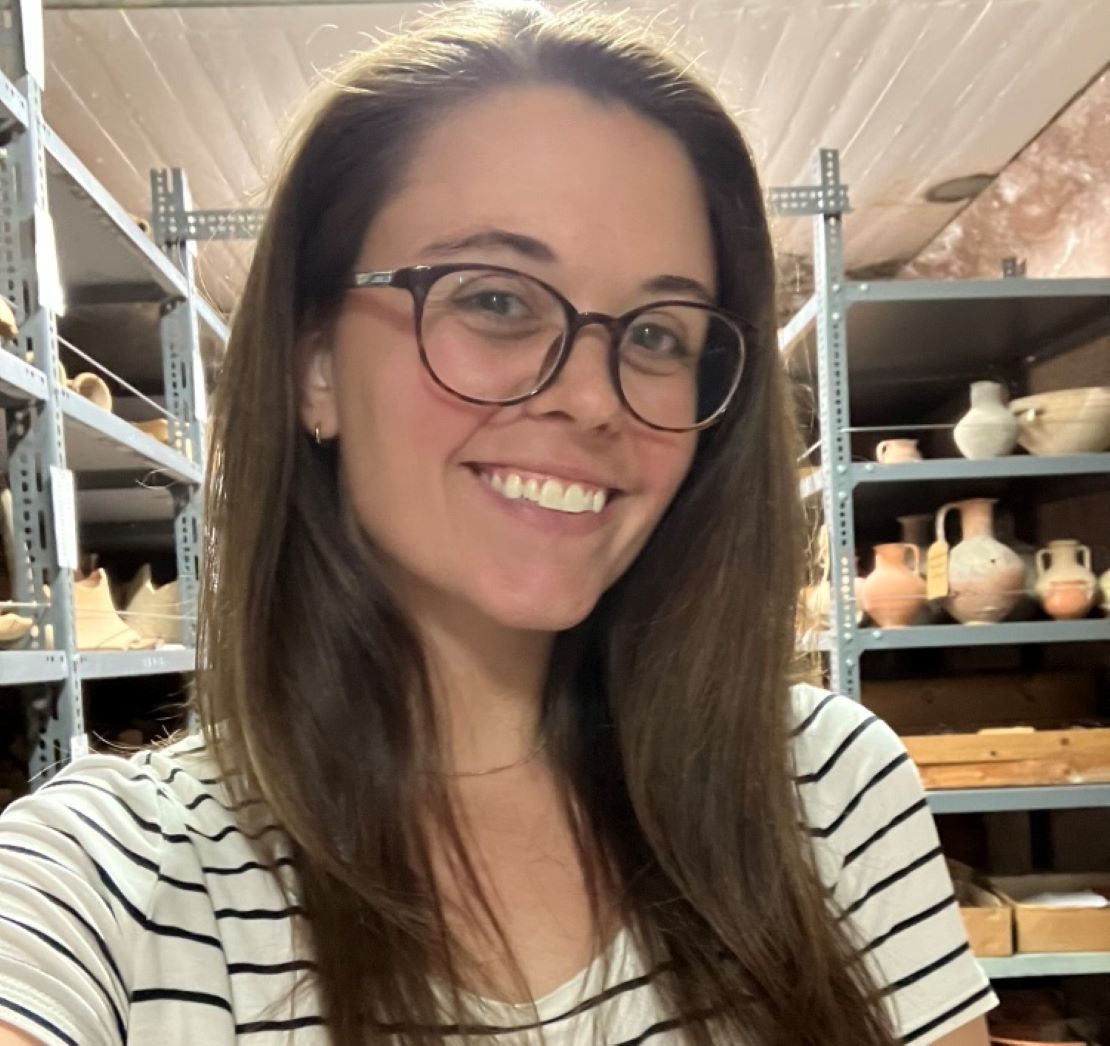History of Outreach

Dr. Ioulia Tzonou, Associate Director of Corinth Excavations, has been leading outreach efforts at Ancient Corinth since 2007. The programs initially targeted Greek schoolchildren K-12 and undergraduate and graduate students from American universities. Their purpose was to enable students to feel at home in the museum and to allow them to experience the artifacts and stories of the ancient people in new ways, especially through the ability to touch the artifacts.
In 2014, the Steinmetz Family Foundation awarded Corinth Excavations a grant to develop additional outreach opportunities and to create educational materials for school audiences in the United States and abroad. The Steinmetz Fellow is responsible for disseminating scholarly information to diverse audiences around the world, either on-site or online.

Charles W. Steinmetz (Charlie) is a Trustee of the ASCSA, donor to the Archaeological Institute of America and Recipient of the Martha and Artemis Joukowsky Distinguished Service Award of the Institute, and a donor and advocate of UCLA and the Cotsen Institute of Archaeology. Charlie, who holds a Bachelor of Science in Commerce degree from the University of Santa Clara and a Masters in Business Administration from the Anderson School at UCLA, is President of the Steinmetz Family Foundation that makes grants to literacy- and curiosity-building educational non-profits in Southern California. Together with his wife Ellen, Charlie has a long-standing interest in K-12 education and outreach, and in the promotion of innovative technologies in archaeology. He has established two Steinmetz Fellowships for the ASCSA for educational programs and outreach, one for Corinth and another for the Athenian Agora.
Steinmetz Fellows:
Taylor Cwikla is the current Steinmetz Family Foundation Museum Fellow at Corinth (2023-2024). She earned a BA and an MA in Classical Archaeology from Florida State University and has experience in Italian and Greek excavation, museum work, and teaching. In Italy, she taught students at the Cetamura del Chianti field school and collaborated in the presentation of an exhibit at the National Archaeological Museum of Florence. Prior to becoming the Steinmetz fellow, Taylor taught ninth-grade Ancient World History at Currey Ingram Academy, a K-12 school that serves students with learning differences. There she differentiated instruction to support students with diverse learning profiles and developed an ancient world history curriculum to promote student-led inquiry.
Taylor joined the Corinth Excavations staff in October of 2023. Since her arrival, she has helped to plan, prepare, and deliver annual programs such as International Archaeology Day, Open Day, and the Pierce collaboration event, and she leads tours of the archaeological site, museum, and seasonal excavations. She also develops new educational initiatives, such as the “Archaeology Alive” program which takes place on a weekly basis and invites museum visitors to engage directly with an archaeologist. To facilitate the dissemination of object-based learning opportunities to an international audience, Taylor designs new online resources from comprehensive lesson plans to more succinct topical activities. Among the most popular online programs is the customizable virtual field trip to ancient Corinth, during which students meet with an archaeologist to learn about the process of archaeology and the site of Ancient Corinth.

Eleni Gizas was the Steinmetz Family Foundation Museum Fellow at Ancient Corinth from 2019-2022. She holds a BA in Classical and Near Eastern Archaeology from Bryn Mawr College and an MA in Classical Studies from Columbia University. She has interned at the Museum of Cycladic Art in Athens and at the Brooklyn Museum in New York, and has excavated at Mygdalia Hill in Patras, at Gournia in Crete, at Morgantina in Sicily, and at Onchestos in Thebes. Prior to becoming the Steinmetz Fellow, she worked as the Assistant Registrar at Kasmin Gallery in New York where she was responsible for managing the gallery’s Post-War and Contemporary Art collection and organizing local and international fine art shipments. Currently, she is the Program Coordinator for the Program in Hellenic Studies at Columbia University and for the Stavros Niarchos Foundation Public Humanities Initiative (SNFPHI).
In addition to assisting with registrarial duties at the museum at Corinth, she designed original bilingual online and on-site educational programs for children and adults, both in Greece and abroad. As a Microsoft Educator, she led “virtual field trips” to Ancient Corinth and instituted Corinth's profile on Flip, a free video platform for use in classroom environments. She worked with local Greek teachers to create custom on-site or virtual lessons to supplement classroom curricula. She participated in international museum programs, such as International Museum Day, International Archaeology Day, and Museum Week. In 2019, she launched the Open Day program that allows students and adults to observe the excavations in Ancient Corinth live. She helped expand Corinth’s global reach by joining the Urkesh One-on-One Program, a virtual educational program that was awarded a Europa Nostra award in 2020.

Katherine Petrole was the Steinmetz Family Foundation Museum Fellow from 2014-2018. Katherine earned her BA in Classical Humanities from Miami University in Oxford, Ohio, and her MA in Museum Studies from Indiana University in Indianapolis, Indiana (IUPUI), with a focus on the intersection of object-based learning and archaeological curation. Prior to becoming the Steinmetz Fellow, she worked at the world-renowned The Children's Museum of Indianapolis, for five years in the Interpretation department where she was responsible for creating, writing, editing, and implementing world-class educational programs for archaeology and paleontology exhibits (National Geographic's Treasures of the Earth and Dinosphere). She spent multiple summers with the Athenian Agora Excavations in Athens, Greece, leading various collections management projects for the sculpture, amphorae, coin, and archival image collections. She is now Director of Education at The Parthenon in Nashville.
While at Corinth, she researched the collection to write and develop lesson plans and online programs; her pioneering work resulted in the first educational resources available directly from an active archaeological excavation in Greece. In addition to fostering partnerships for Corinth Excavations, including with the Microsoft Educator Community, she created and conducted the first virtual field trip from Greece and has led over 175 digital programs for over 5,000 students in 36 countries. She helped manage the Corinth Excavations database and collection of more than 300,000 artifacts and records from over 120 years of systematic excavation, creating over 2,000 new artifact records.
More Contributors:
Nancy Antonellis is a high school Latin and Classical Humanities teacher in Brockton, Massachusetts. She helped modify the lesson plans in order facilitate instruction at all levels of the K-12 spectrum. She uses many of the lessons as part of the curriculum for a new archaeology course she created at her school. Nancy has contributed to similar outreach efforts during her tenure as a member of the Educators’ Advisory Board at the Museum of Fine Arts in Boston.
Yun-Hsin Chang (Funmi) and Ching-Yuan Wu (Dwight) volunteered to translate the lesson plans into Mandarin Chinese. Additionally, their thoughts about how the lesson plans could benefit history curricula in Taiwan and China have broadened the scope of outreach at Corinth Excavations. Funmi grew up in Taiwan and received a Ph.D. in field linguistics at the School of Oriental and African Studies (SAOS) after completing one year of fieldwork in Nigeria. She thought of becoming an Africanist, but is now a full-time mom with her young daughter and historian-husband, Dwight, who is a Ph.D. student at the University of Pennsylvania and a 2015-2016 Regular Member.
Emilio Rodríguez-Álvarez volunteered to translate the lesson plans into Spanish and Galician. Born in Vigo, Galicia, in the northwest of Spain, Emilio is a Ph.D. candidate at the School of Anthropology, University of Arizona, and former ASCSA Regular and Associate Member (2014-2016). He has worked at Corinth studying raw materials and techniques for pottery manufacture in the region during the Archaic period.
Dr. K.A. Rask received her Ph.D. from The Ohio State University and specializes in the archaeology of Greek and Etruscan religion. She teaches at Duquesne University in Pittsburgh, PA, and has excavated in both Greece and Italy. She is interested in the material and haptic aspects of ancient religion, which led to her recent 3D scanning project. With the help of four undergraduate assistants, she scanned 60+ artifacts at the Athenian Agora and Corinth Excavations.

